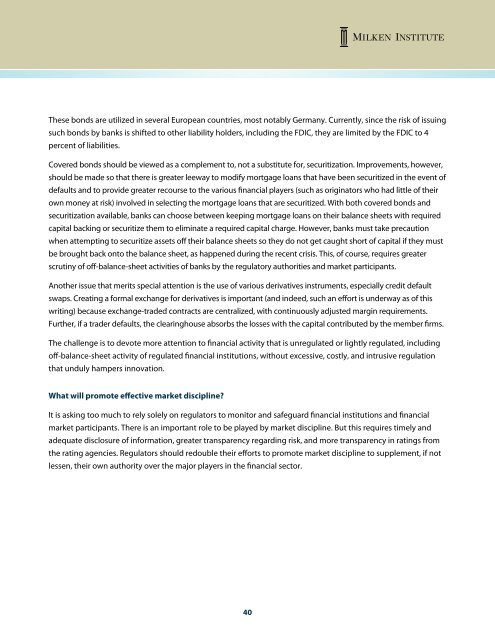The Rise and Fall of the U.S. Mortgage and Credit ... - Milken Institute
The Rise and Fall of the U.S. Mortgage and Credit ... - Milken Institute
The Rise and Fall of the U.S. Mortgage and Credit ... - Milken Institute
You also want an ePaper? Increase the reach of your titles
YUMPU automatically turns print PDFs into web optimized ePapers that Google loves.
<strong>The</strong>se bonds are utilized in several European countries, most notably Germany. Currently, since <strong>the</strong> risk <strong>of</strong> issuing<br />
such bonds by banks is shifted to o<strong>the</strong>r liability holders, including <strong>the</strong> FDIC, <strong>the</strong>y are limited by <strong>the</strong> FDIC to 4<br />
percent <strong>of</strong> liabilities.<br />
Covered bonds should be viewed as a complement to, not a substitute for, securitization. Improvements, however,<br />
should be made so that <strong>the</strong>re is greater leeway to modify mortgage loans that have been securitized in <strong>the</strong> event <strong>of</strong><br />
defaults <strong>and</strong> to provide greater recourse to <strong>the</strong> various financial players (such as originators who had little <strong>of</strong> <strong>the</strong>ir<br />
own money at risk) involved in selecting <strong>the</strong> mortgage loans that are securitized. With both covered bonds <strong>and</strong><br />
securitization available, banks can choose between keeping mortgage loans on <strong>the</strong>ir balance sheets with required<br />
capital backing or securitize <strong>the</strong>m to eliminate a required capital charge. However, banks must take precaution<br />
when attempting to securitize assets <strong>of</strong>f <strong>the</strong>ir balance sheets so <strong>the</strong>y do not get caught short <strong>of</strong> capital if <strong>the</strong>y must<br />
be brought back onto <strong>the</strong> balance sheet, as happened during <strong>the</strong> recent crisis. This, <strong>of</strong> course, requires greater<br />
scrutiny <strong>of</strong> <strong>of</strong>f-balance-sheet activities <strong>of</strong> banks by <strong>the</strong> regulatory authorities <strong>and</strong> market participants.<br />
Ano<strong>the</strong>r issue that merits special attention is <strong>the</strong> use <strong>of</strong> various derivatives instruments, especially credit default<br />
swaps. Creating a formal exchange for derivatives is important (<strong>and</strong> indeed, such an effort is underway as <strong>of</strong> this<br />
writing) because exchange-traded contracts are centralized, with continuously adjusted margin requirements.<br />
Fur<strong>the</strong>r, if a trader defaults, <strong>the</strong> clearinghouse absorbs <strong>the</strong> losses with <strong>the</strong> capital contributed by <strong>the</strong> member firms.<br />
<strong>The</strong> challenge is to devote more attention to financial activity that is unregulated or lightly regulated, including<br />
<strong>of</strong>f-balance-sheet activity <strong>of</strong> regulated financial institutions, without excessive, costly, <strong>and</strong> intrusive regulation<br />
that unduly hampers innovation.<br />
What will promote effective market discipline?<br />
It is asking too much to rely solely on regulators to monitor <strong>and</strong> safeguard financial institutions <strong>and</strong> financial<br />
market participants. <strong>The</strong>re is an important role to be played by market discipline. But this requires timely <strong>and</strong><br />
adequate disclosure <strong>of</strong> information, greater transparency regarding risk, <strong>and</strong> more transparency in ratings from<br />
<strong>the</strong> rating agencies. Regulators should redouble <strong>the</strong>ir efforts to promote market discipline to supplement, if not<br />
lessen, <strong>the</strong>ir own authority over <strong>the</strong> major players in <strong>the</strong> financial sector.<br />
40















